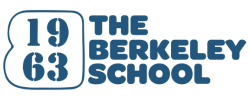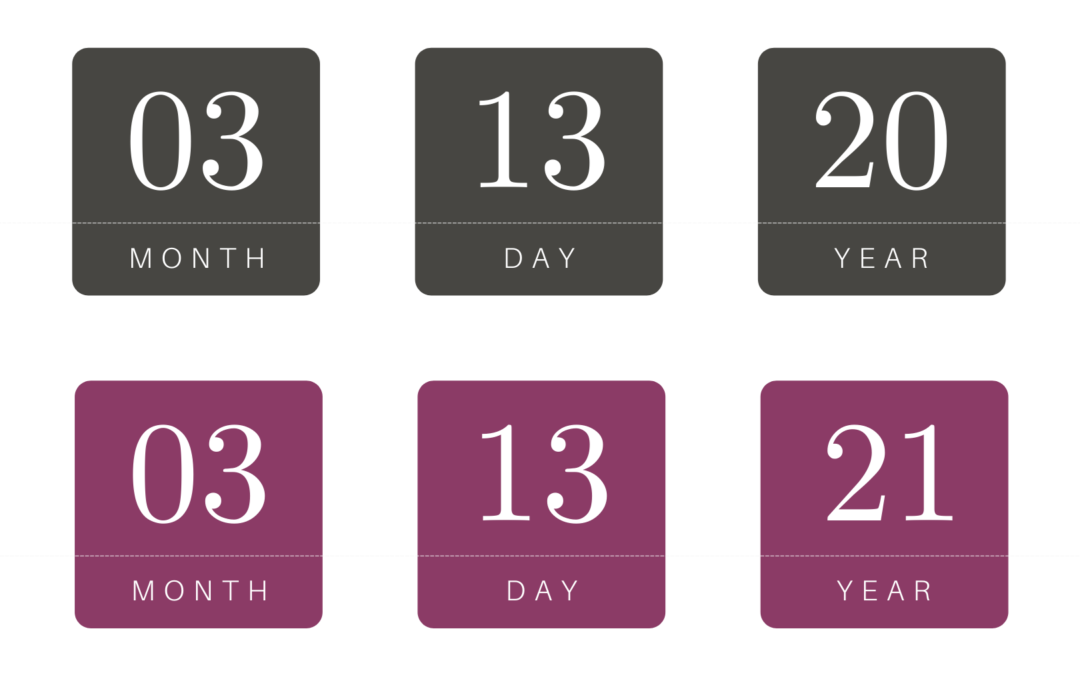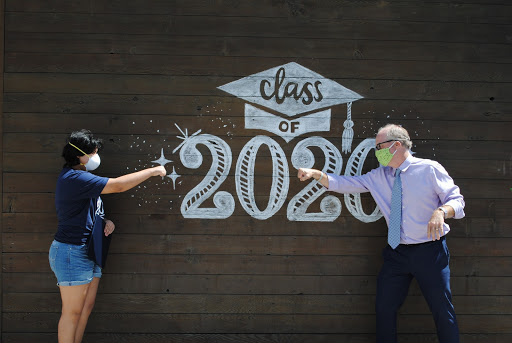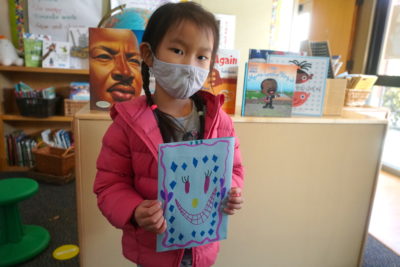One year ago this week, our school closed both campuses, in hopes that we could return after spring break.
One year ago, teachers and families had just completed their spring conferences – two days when almost every student, parenting adult, and teacher comes to school and spends time together talking about what matters. Preschool students were getting ready for the annual Kindness Festival. Dress rehearsals for the middle school play were underway. And eighth graders were gearing up for their capstone trip to Costa Rica – and graduation in June.
In short order, we began to see that many of these familiar and welcome events would need to be re-imagined, or postponed. And we came to understand that our hopes for a quick return to our campuses didn’t align with the evolving reality of a global pandemic. Our school’s mission – ignite curious minds, awaken generous hearts, engage a changing world – ensured that we didn’t rest in the magnitude of that understanding. Our faculty and staff’s collective focus on continuing to educate, care for, and love our children left us no time to marvel at the unprecedented situation or speculate about the longer term future. We knew we had big work to do – and we needed to do it together.
How does a 57-year-old school transition from a deeply place-based educational program – built around daily interactions among teachers and students in intentionally designed classroom and campus environments – to a home-based educational program?
And how does that transition happen over a matter of weeks?
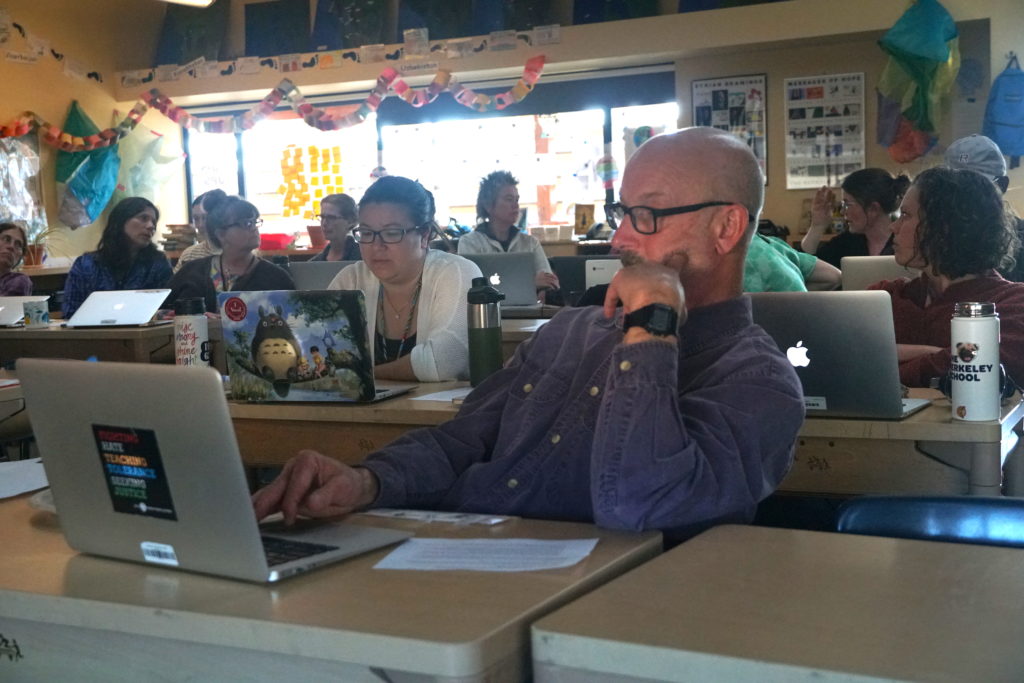
TBS teachers gather for a crash course on teaching and learning at a distance.
How does a 57-year-old school transition from a deeply place-based educational program – built around daily interactions among teachers and students in intentionally designed classroom and campus environments – to a home-based educational program?.
This formidable challenge truly ignited our minds. Teachers and administrators dove into the process of overhauling our entire program structure. They created our first-ever schoolwide Distance Learning Plan. And, somehow, they found time to engage in collaborative, time-intensive professional development – by themselves, with TBS colleagues, and with a local, national, and international community of educators dedicated to seeing and supporting students everywhere.
Even with ignited minds, we struggled to learn new ways of doing familiar things. And that struggle was supremely frustrating. As educators, we’d spent years and years honing the skills and practices that made us the successful teachers and administrators we were; but, in many ways, the circumstance called for a whole new set of skills.
Learning to build and incorporate those skills took time — it took tolerating the ways in which we felt like our results were falling short of our goals, even though we were working as hard or harder than we ever had in our professional lives. As people quite familiar with encouraging students to push through obstacles, we were now processing what it feels like to hear that advice with those stumbling blocks directly in front of us. We realized this is how our students can feel when they are learning – and we did our best to remind ourselves and each other of this truth.
One of our favorite examples of this is “The Backwards Bike” – an experiment that reveals the difficulty of executing a familiar task with a tool that looks the same but responds in very unfamiliar ways.
At the same time, we knew our families were grappling with the same challenges – creating their own “Home-Based-Everything Plans” and reconfiguring schedules and patterns that were dependent on children being seen and supported on a school campus every day. Our children experienced the unique feelings of uncertainty that arise when even the adults around them aren’t sure what to do.
But what’s true of all children – and especially TBS students – is their ability to show resilience, their capacity to adapt, and their combination of comfort and skill when faced with change. They inspired us to exercise those same qualities.
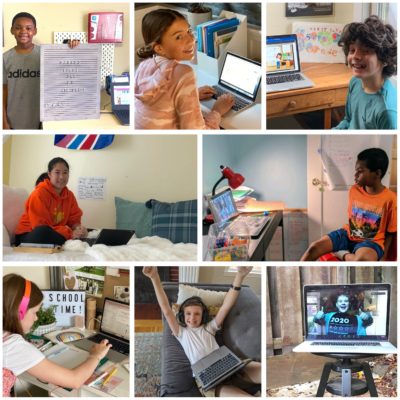
TBS students demonstrating the flexibility needed to learn in a whole new way.
Three weeks into March, TBS was up and running in full “Distance Learning Mode”. Some things were familiar: being greeted by a teacher’s voice in the morning, seeing classmates’ faces, and continuing with the projects and assignments that had been in place before March 13. Some things were different: joining morning circle from the bedroom or the kitchen table, figuring out which link was the “door” to the next classroom. And some things were just strange. We were having a group experience but most often processing it by ourselves – and that is not how TBS students and teachers learn to operate.
We persisted. We led with our curious minds: identifying challenges and opportunities, looking for possible solutions, gathering as much information as we could, and making difficult decisions to guide the way forward. Those decisions resulted in rapid implementations and iterations that moved at a pace unfamiliar to all of us: students, educators, and parenting adults. We expanded our use of Google Classroom. We began to integrate SeeSaw, NearPod, and other platforms designed to help teachers and students work together more effectively. And we worked to adjust to the challenges and opportunities of Zoom.
So we made progress. But it didn’t always feel like that. Each member of our community wrestled with the fear and uncertainty that arose from the onset of a global pandemic with no end in sight. Each of us experienced the feelings of worry, frustration, anger, and grief that come with ambiguous loss. Those were – and are – feelings that even ignited, curious minds couldn’t erase.
Along the way, we kept talking directly with each other about what was easy and what was hard, what was working and what wasn’t, and how much we felt we didn’t know. Parenting adults became intimately familiar with the daily challenges – and joys – that teachers experience when working with students. Teachers learned more about the ways that students learned differently online, surrounded by family, without the multiple social interactions that had previously characterized their days at school.
Those conversations were heartfelt, complex, and often difficult. We did our best to be real with each other while also understanding that none of us had the ability to magically wipe away the frustrations we felt or miraculously produce clarity about what, exactly, we were facing.
‘Keep going’ meant doing what the last phrase of our mission calls us to do – engage a changing world.
Meanwhile, the pandemic continued. We learned more about the nature and impact of COVID and watched helplessly as more and more people became sick, died, and suffered from the economic and social impact of shutdowns. And just when we thought we had reached our emotional capacity, video of the murder of George Floyd catapulted our drive and resolve to fight the other lingering plagues of our world — in this case, the plague of racial injustice. Many of us took actions in support of the Black Lives Matter movement that made us feel simultaneously more uncertain, more hopeful, and more determined.
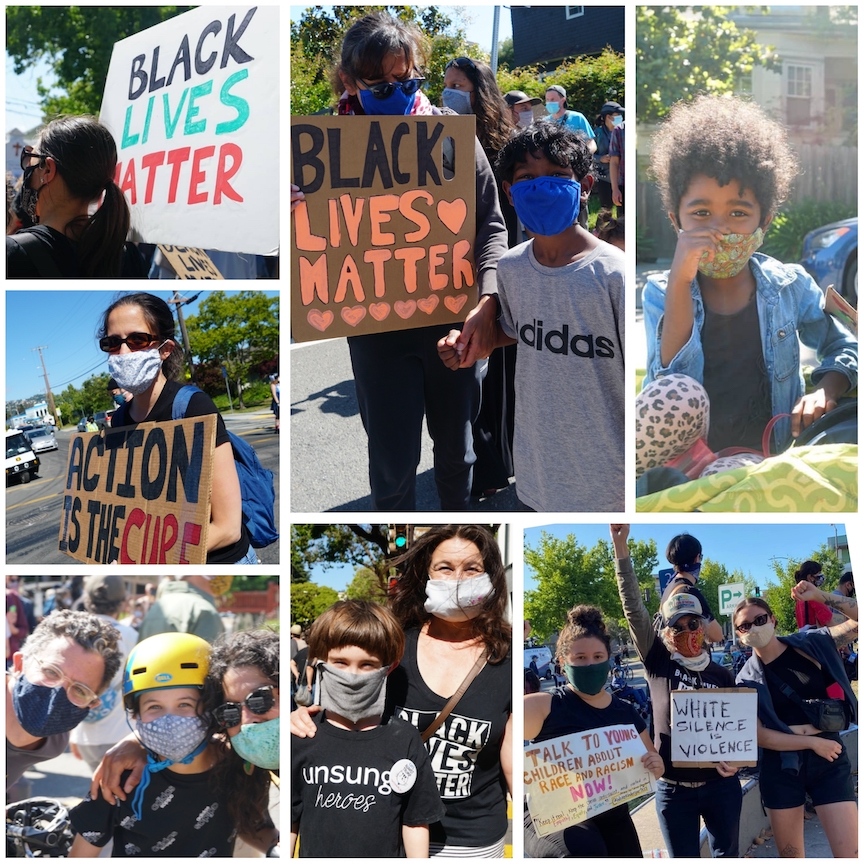
TBS students and faculty show support of Black Lives Matter during the “Bury Racism” march in Berkeley.
As TBS educators, our ability to share what was and wasn’t working with ourselves, our students, and our families led to adjustments that made our distance learning plan more effective with each revision. But what mattered more was the way these conversations awakened our compassion and sharpened our awareness. Those experiences gave us the strength to see and solve new problems – and to keep going.
“Keep going” meant doing what the last phrase of our mission calls us to do – engage a changing world. It’s a line we often use when we refer to our graduates and how we prepare them for high school, college, and the world to come. In May, our eighth graders faced the reality that the milestones and experiences they had looked forward to throughout their entire career at TBS – the middle school play, spring dances, the volleyball season, their trip to Costa Rica – would not happen. On top of that, the formal graduation ceremony they had watched for years as younger spectators would not be the ceremony we’d be able to give them.
We faced this reality with them. That awakened our hearts, and gave us the motivation to design a graduation ceremony that would be meaningful, memorable, and give people as much “seen and supported” feeling as we possible. With minds ignited, we set out to engage the changing world once more. And we did it – together.
Our mission cycle – ignite curious minds, awaken generous hearts, engage a changing world – has played out countless times over the last calendar year..
The 2020-21 school year came to a close – but our school’s journey was just beginning. Over the course of the summer, TBS teachers and administrators worked constantly to understand what the upcoming school year might hold, building on lessons from the spring and doing everything possible to plan for an unprecedented and hard-to-predict beginning for the 2020-21 school year..
During those summer months, we were reminded that the practical realities of interdependence make it much more challenging to engage change. Frequent updates to federal, state, or local guidance would upend, redirect, or pause work that we had been planning for weeks. Even though that turned out to be good practice for the school year, it’s impossible to capture how all-consuming, and exhausting, those iterations were. It was a “summer” in name only.
But we made progress. When our Early Childhood Campus reopened on July 12, 2020, the sights and sounds of children and teachers in classrooms and outdoor spaces again reminded us about how much school – and being together – matter.
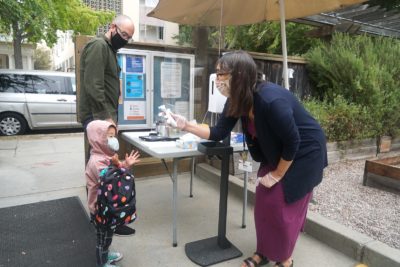
Preschool Director Sima Misra checks temperatures at arrival.
Our mission cycle – ignite curious minds, awaken generous hearts, engage a changing world – has played out countless times over the last calendar year. Teachers on both campuses are now equally skilled at teaching children in person, online, or both simultaneously – and can “code switch” between modes with astonishing speed. Students on both campuses have adapted to protocols and routines that allow them to be together safely while preserving room for joy and excitement. And families have found ways to build and maintain community with each other even when physical proximity is limited or impossible.
While we try to celebrate these mission-connected successes regularly, we have also been careful to keep those who have contracted the virus and who have lost friends and family to the virus on our minds and in our hearts. In honor of MLK Day this year, and using Dr. King’s commitment to service as a model, our community wrote letters of gratitude to the people who have truly gone above and beyond during the pandemic: our healthcare workers.
We also made a point to remain the civic engagement school. Already agile at incorporating current events into curriculum, TBS teachers designed lessons that focused on what was going on in the world and the ways that TBS students could take action to make things better – like this project on the disproportionate impact of COVID-19 on our Latinx community, and a student-created website all about the 2020 election. Just after the website was published, this 8th grade explainer article about the Electoral College was listed second in a Google search on the topic.
365 days later, I’m writing this reflection from a place of gratitude and hope, looking back on a pandemic year that – like a rollercoaster ride – has felt both incredibly long and shockingly short. We put together a video retrospective to help ourselves see our journey more clearly – and while it helps, I am certain we’ll be shaping and telling the story of “pandemic school” for years to come.
In a few short weeks, our teachers will be fully vaccinated. On-campus students will leave school on Friday, April 2 for break and return on Monday, April 12 to routines and protocols that are now as familiar, and reassuring, as those we left behind in 2020. And we are planning for a graduation ceremony for the Class of 2021 that will include all of the community support and love our students need and deserve.
We aren’t “there” yet – but we know we have an opportunity. See and work towards a “there” that builds on what we’ve learned this year. Our hearts are awakened. Our minds are ignited. And we are more than ready to continue engaging this changing world – together.
